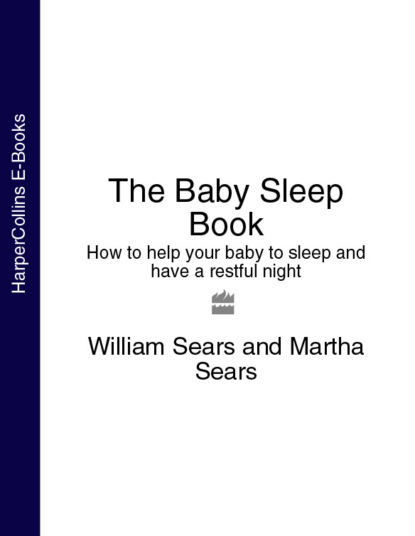По всем вопросам обращайтесь на: info@litportal.ru
(©) 2003-2024.
✖
The Baby Sleep Book: How to help your baby to sleep and have a restful night
Автор
Год написания книги
2018
Настройки чтения
Размер шрифта
Высота строк
Поля
Here’s a preview of the five steps you will now learn:
Find out where you and baby sleep best.
Learn baby’s tired times.
Create a safe and comfortable environment conducive to sleep.
Enjoy a variety of bedtime rituals.
Help baby stay asleep longer.
We also call this plan:
First we offer some precautions:
If your baby is a newborn, do not jump into this plan (or any other plan) in the early weeks. Get to know your baby first, before you introduce a sleep plan into your parenting life.
Be aware that not everything we suggest will be right for your baby. We don’t like parenting books that tell parents “this is how you have to do it. This is the only right way. Tough luck if it doesn’t fit your own ideas or your baby’s personality.” We believe that parents who know and love their baby are the best judges of how to care for that baby. This is why it’s so important to first get attached to your baby – so that you have the wisdom to know what’s best for your baby. In this book we will give you lots of strategies to help your baby learn healthy sleep habits. Which ones you choose depends on your baby’s unique sleep temperament.
So let’s get started, and here’s to a good night’s sleep … finally!
step 1: find out where you and your baby sleep best (#ulink_7a1ead75-b782-5d64-b606-d5062ec0d065)
Where will your baby sleep best? With you in your bed? In a co-sleeper, Moses basket cradle, or cot next to your bed? In a cot in your room, or in his own room? Where do you sleep best? Where do you want your baby to sleep?
Realistically, be prepared to play musical beds with all of these sleeping arrangements as you try to work out where all of you get the best night’s sleep. Expect these sleeping arrangements to change at various stages of your baby’s development. The only people who can answer the question “Where should baby sleep?” are Mum and Dad. Listen to what your baby and your inner voice are trying to tell you! Perhaps you have a new baby (or you will soon) and you are trying to decide where baby will sleep. Or, if your current sleeping arrangement is one of the reasons why you or your baby are not getting a restful night’s sleep, let’s explore your three options:
1. Sleeping alone in baby’s own room. This is the traditional picture that many first-time parents envision for their babies. As you flip through baby magazines and furniture catalogues you see pictures of smiling parents (who look like they’ve had plenty of sleep) placing their baby into a cot or cradle in the corner of a beautifully decorated nursery with the evening sunset filtering through the curtains. Parents gaze happily at their baby, who smiles up at them. You dream that this is how your baby will go to sleep, too. You’ll pat her little tummy, kiss her on the cheek and say “night-night”. She closes her eyes, you tiptoe out of the room, and you and your partner enjoy a nice quiet evening together. Your baby sleeps peacefully the whole night through.
Sounds like a fairy tale, doesn’t it? Will it all come true? Eventually, but not in the early months. Most, if not all, younger babies need more out of their parents at bedtime than this magazine picture. This is “quality time” for babies. They often do not willingly succumb to quick-to-sleep methods.
Will this sleeping arrangement work? It may work for easy-going babies. Mellow babies tend to fall asleep more easily and awaken less often at night regardless of where they sleep. Some of you parents-to-be are nodding your head, “Yeah, that’s the kind of baby we are going to have, right sweetheart?” Yet many of you have discovered that you have been blessed with a baby who is already letting you know that she’s going to need more nighttime closeness than this distant arrangement offers.
Those of you with cot sleepers are probably in one of two situations right now: either your baby had been sleeping well in a cot for months, and is now waking up too often, or you have been trying to get your baby to sleep in a cot for months, but he has never really slept well in the other room and you (and he) are tired.
You have two choices. You can either continue to try to get baby to learn to sleep well in the cot using the rest of the steps in our plan, or you can explore some other options of where baby can sleep.
Why won’t your baby sleep well in a cot in his own room? It may be that teething or a temporary medical cause of night waking is suddenly rousing your baby at night. We discuss many such causes of night waking in chapters 3 (#u40d788b3-9557-5179-9904-2c617c25b004) and 11 (#litres_trial_promo). But there may be much more to this picture. If your baby has never really slept well alone, and nights of stumbling down the hallway to rescue your crying baby every two hours have taken their toll, it may be that your baby is trying to tell you that he needs more nighttime comfort and closeness.
“But our neighbour’s baby sleeps just fine through the night in her own room”, you may hear. Every baby has a different personality. Some needier babies simply need more of you day and night. On page we discuss infant personalities and temperaments and how these relate to nighttime needs. It’s time to lose the magazine fantasy and work out on your own what is best for you and your baby. If we had to pick the single most important message of this book, it would be: trust your own instincts and make your own decisions about what is best for your individual baby and you.
2. Sleeping in your room, but not in your bed.
This is a common sleep set up for two types of families: those who are living in a one-bedroom apartment (like medical resident Dr Bob was when his second son was born – four people sleeping in one room!), and those who want their baby close by (but not so close that baby’s tiny feet are kicking them in the ribs). Maybe you want baby close by simply for convenient breastfeeding, because baby wakes up several times each night. Or, perhaps your baby is a great sleeper, yet you prefer having baby sleep near you for your own peace of mind.
Having baby in your room has these advantages:
When baby wakes he is within arm’s reach or just a step away from you.
You can get to baby quickly and rock or feed him back to sleep before he fully wakens.
If you wake up, you can easily check on baby to reassure yourself all is well.
You feel close to baby, yet you and your partner have the bed to yourselves.
Baby enjoys a sense of security.
You can easily bring baby into your bed to feed back to sleep so your comfort is less interrupted.
Of course, there are possible disadvantages as well:
If you are a light sleeper, you may find yourself disturbed by every sound that baby makes.
Baby may grow accustomed to your proximity and may wake up more often because there is something to wake up for (feeding) and someone to wake up to.
Here are some common options for finding a safe place for baby to sleep in your room:
The Arm’s Reach Co-sleeper. This is about as close as you can get to having baby nearby but not technically in your bed. With the co-sleeper, you can truthfully tell your in-laws, “No, our baby is not sleeping in our bed with us.” Since baby is on a separate mattress, he won’t feel your every movement, and you won’t feel his. You and your partner can enjoy your intimate space. It also gives you instant access to baby when he wakes (he’s within arm’s reach) so you can move close to him and feed or pat him back to sleep before he fully wakes up and cries. (See page for illustration of the Co-sleeper (#litres_trial_promo)).
Cradle or Moses basket. These baby beds have the advantage of being right next to your bed, but don’t offer the convenience of easy-access feeding like the co-sleeper. Cradles and Moses baskets are portable, however, so you have the flexibility of seeing if baby would sleep well in his own room, too.
Swinging hammock bed. This baby bed is like a soft-bottomed cradle, and it hangs from a spring inside a steel frame, so every time baby moves, the spring gently moves and often lulls baby back to sleep. It too has the advantage of being portable, so baby can sleep in any room of the house. It can sit right next to your bed for easy access to baby at night.
Some of you reading this book may be finding that your baby thinks being in the same room with you just isn’t close enough. Baby needs to feel you right next to him, and if he doesn’t, he wakes up. So, what do you do? Co-sleep!
3. Sleeping with baby in your bed. Perhaps your baby isn’t even born yet, but you’ve decided that you want to sleep with your baby right from the start. You may feel: “after all, she’s a baby. She’s been close to me for nine months.” Or maybe you are just getting to know your newborn, and you aren’t yet sure what you want to do. Or, you may encounter this situation. “When I put our baby in the cot he wakes up a lot, but as soon as I bring him into our bed he sleeps better – and so do we.” Baby is trying to tell you something: “For my well-being I need to sleep closer to you.” Listen to your baby!
Sleeping with your baby has some unique advantages:
You can feed baby back to sleep while you fall easily back to sleep.
Baby can fall back to sleep more quickly because you can comfort him before he fully wakes up, and you fully wake up.
Baby may sleep longer and better because you are nearby.
Baby benefits from eight extra hours of closeness each night.
Working parents get extra “touch” time with baby.
Studies have shown that even though sleep-sharing babies wake up more to feed, co-sleeping mothers actually get more restful sleep compared to mums who don’t sleep with their babies.
These very advantages can also turn out to be disadvantages (depending on how you look at it):
Baby may actually wake more frequently because he feels you nearby.
Some parents don’t sleep well with a baby in their bed. They want their baby close, but not that close.
If Mum sleeps well with the baby, but Dad is a light sleeper and can’t get used to the extra presence in his bed, Dad may not sleep well. This may prompt Dad to find another room to sleep in, such as the pastel-coloured nursery that he painted for the baby.







